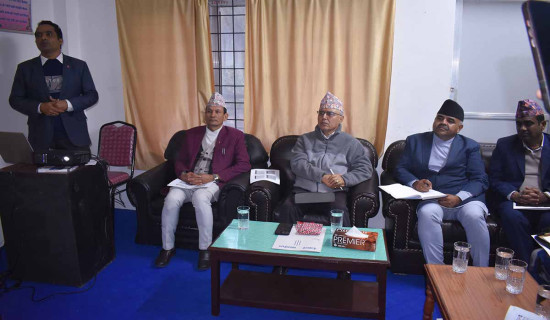- Thursday, 5 February 2026
Moderating Social Media Instigation
Social media has emerged as the integral part of our life and has positive indications that it will impact our lives in many more years to come. With the touch of a finger tip, it has turned global phenomena into a local one. With eye-catching contents, informations and networkings, it has attracted billions of people worldwide and millions in Nepal. A study shows that 6.8 billion people worldwide, around 60 per cent of global population, are active in social media. In Nepal, 12.60 million people, 41 per cent of population, are engaged on this platform. With such a large number of users and user-friendly access, it has entered the very core of our lifstyle. Used wisely, this platform can satiate our hunger for the content we desire. If not, it can lead to consequences we would never love to witness and experience.
The digital platform, meant to share ideas and information, has also been misappropriately used to instigate violence and disorder in the society. The hate speech, misinformation, fake news and extremist contents in this platform has not only troubled Nepal, but also different parts of the globe. As per a 2022 report of Amnesty International, Myanmar’s 2017 violence and displacement of Rohingya Muslim minority was fueled by false information, hate speech and incitement on social media, more specifically on Facebook, and the report states that Meta has a responsibility to provide effective remedy to the survivors.
Threats to social harmony
In recent months, though not in a big scale of violence, there are incidents of disturbance in the social harmony in different parts of Nepal, the latest being in Banke district, impacted mainly by instigating and extremist contents in social media. The local administration had to take extreme measure like issuing curfew to normalise the situation in Dharan, Sarlahi and Banke districts to protect religious and communal harmony. All were meant to generate hatred and negativity affecting the very social harmony of highly mingled societies.The issue of religious and communal hate speech is so precarious that it can immediately generate volcanic reactions. Recent unethical social media behaviours, if not handled wisely, are the indications for bigger social disruptions in future.
Nepal’s social diversity is characterised by its harmonious aspect. A home to around 30 million people, 142 ethnic groups, ten active religions and 124 mother tongues, Nepal’s exquisite diversity never fails to amaze inquisitive faces. Amicable behaviour and exchange of cordial wishes from different religious leaders towards one anothers’ religion and festivals is common scene in Nepal. A unique mingling of multiethnic, multilingual and multireligious nationality, Nepal has as much exquisiteness of its diversity as it has risk of diversion from diversity. In recent years, Nepal’s social diversity and harmony has faced challenges because of volatile political scenario and the forces that seek to cash in on it.
A recent picture of religious solidarity rally led by the leaders or gurus of different religions in Nepalgunj depicts that everyone wants social harmony. But some posts from insignificant people in social media instigating for turbulence, and eventually leading to escalated tensions, shows that the message of harmony is not well spread at the grassroots level. The local political leaders, religious gurus and administration should go hand in hand to spread the culture of social harmony and to demonstrate that unity is their strength.
In Banke, there is a tradition of regular meetings of gurus of different religions in district administration office to review the condition of religious and social harmony in the district. On the eve of diverse religious festivals, such meetings become the platform to exchange wishes which can be soothing example for other tension-prone districts as well. But message of such meetings should be well channelled so that general public develops convincing eye on solidarity and harmony.
Regulatory action
A criticism to social media as being ‘the factory of fake news’ should draw proper regulatory attentions. Catchy news items detached from truth are misleading public. Because of pervasive fake news of social media, people’s distance from truth is increasing, affecting their emotions, reactions and actions. Fake news dangerously lead towards political polarisation, trust gaps, ethical deterioration, manipulation of public opinions and social tensions. Nepal’s case is not an exception. In an age of unforeseen growth of aritificial intelligence (AI), social media platforms must extensively use AI tools to watch and identify false and extremist content so that it can be blocked before it reaches to general public. These platforms should be responsible for the activities happening on them.
Regulatory policy
Besides, national governments should enhance regulatory policy and capacity to monitor such activities and bring the culprits to justice. The legal provisions should strike a balance between free speech and social well being. The rapid flourishing of social media demands that general public be educated regarding the pros and cons of social media use. Local administrations, local level governments, NGOs and civil society can collaboratively launch nationwide social media awareness campaigns. Social media literacy not only helps in identifying misinformation on digital platform, but also reporting the abusive contents.
Nepal’s diversity is not rooted in shaky grounds, rather deeply ingrained in the culture of trust and harmony. As Ola Joseph says, ‘‘Diversity is not about how we differ, it is about embracing one another’s uniqueness’, we should further enhance the trust and respect to religious and social harmony. Social media instigation should not get a chance to intensify hatred, rather it should be stifled by our solidarity and unity. Only a bad carpenter quarrels with his tools, a wise one makes the tools work in his favour. Social media platforms can also be massively used to promote religious tolerance and social harmony. Sensible use of social media never allows hate speech grow its wings. Concerted efforts of different actors of governance, guided by strong legal and institutional framework, can pave the way to prudent social media behaviour.
(The author is an under secretary, government of Nepal. @hsharmapoudel)

















